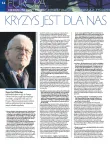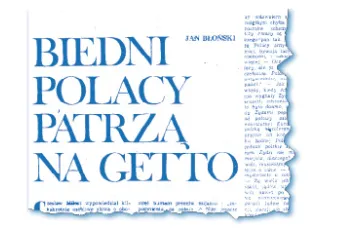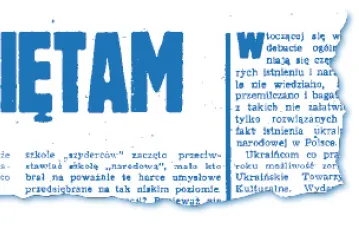Wykupienie dostępu pozwoli Ci czytać artykuły wysokiej jakości i wspierać niezależne dziennikarstwo w wymagających dla wydawców czasach. Rośnij z nami! Pełna oferta →
How does it feel to live in a country that many consider the last paradise in a Europe characterized by financial, economic and political crisis?
It causes a lot of problems to live in paradise. One being that our franc has such a high exchange rate against the euro that we are going to run into a lot of difficulties with employment. Today (August 9th), the euro exchanges for around 1.04 francs while two years ago it was 1.60. For Switzerland, that means we lost almost two thirds on the export value of our goods-and as you know, we export a lot of goods. Almost every other franc we earn comes from outside of Switzerland. So yes, we are still flying high but I think the one who is flying high can also fall very deep.
There is also a strong feeling of anxiety in Switzerland. We don’t feel that everything is as it should be and a lot of people are worried. In Zurich we have a huge problem with the banking sector-almost 50% of the city’s tax revenue is generated in the financial services sector. So with the crisis of the banks there is a sharp decline in revenue. And in the past two years, they didn’t pay any taxes at all. This summer, the elimination of more than five thousand jobs from UBS and Crédit Suisse was announced, many of them in Switzerland. This is only one example of the problems we face at the moment. People here and elsewhere in Europe feel they are surrounded by problems that are getting closer every day. And I’m not sure whether it is better to confront the problem directly or to feel the problem approaching.
Do these problems come from the outside, from other European countries, or do they originate from within- from your own country?
I don’t think there is a big difference, because we are very much in the middle. Although we are not an official member of the European Union, we still act as if we were, since we are connected to it in so many ways: economically, politically… Some experts say that Switzerland is like a miniature of the European Union. Especially on the political level, many of our laws were simply adopted from the European Union. We are forced to accept these laws because we are not a remote island and we have to do business with the EU countries all around us. So in fact we are in the European Union without having any vote in it. This situation is difficult and that’s why I’m not sure if you can draw such a sharp line between the outside and the inside. We are somewhere in between. And we have many different problems such as institutional problems or the problems with our democracy at the moment. We also have problems with our civil rights because they no longer ensure the freedom or liberty of the people but actually take away parts of that liberty. Take, as an example, the minaret referendum we had.
18 months ago you had a referendum. The government asked
the voters whether to ban the construction of a minaret. The outcome was a shock to many.
It was 58 for and 42 against the ban, which is a very stark polarization. Referenda in Switzerland are usually very close races. 49-51 percent is the norm, and to have 58 percent is very high.
So the percentage of people voting in favor of banning
minarets was very high even though your constitution
guarantees the freedom of religion…
Exactly. One hundred thousand people can demand a vote on anything by means of a referendum. If they are successful, they could even decree that you have to wear pink shorts every Tuesday. Such a law would be legal, even though it would be in conflict with our constitution as well as international treaties. But we don’t have a supreme court which could rule that such a law is against the constitution and thus ban it. Whatever the people want is law.
As you can see, we have some internal issues, but we also have a problem you can observe in many other countries, namely, that due to the division into political parties there is a gap at the centre of society between the right and the left wing. One of the reasons of Switzerland’s success was the ability to find a compromise in any situation. But these days, this is becoming more and more difficult.
ii
You said that currently, Europeans have a feeling that
the problems are coming closer and closer. In your novel “Hundert Tage," by contrast, the main character, David, feels
that the problems are not as close as they should be. He goes
to a place where he can actually put his hands on those
mythical problems. Your character is a typical European who
wants to get a first hand experience of the difficulties of life
in Africa. But why? Why does he escape from paradise?
At the time presented in the novel this paradise was still real.
There is something specific about David and his generation, which is also my generation. He grew up in the 1980s, at a time in which everything was arranged and frozen as well. The economy was on the rise and we were just washed up by the tide.
There was a social contract in Switzerland, and I think
it was similar to many other countries, that if you went to
school, if you worked hard, you would move up with the
tide. You would get richer but only to the level of your social
class, because your place in the society was fixed. If you were the son of a doctor, you would be a doctor and if you were the son of a plumber, you would be a plumber. There was no point in trying to climb the social ladder. You would be exactly in the same place where you had been at birth. For a young person this perspective can be frustrating, as you had no possibility to do or change anything. Moreover, everything had already been built in Switzerland. Ursula Koch, a councillor of Zurich at that time, once said that Zurich had already been built, Zurich was already completed as an architectural, political and social project. We had just reached the end of history in Western Europe.
There was only one fear, only one nightmare-Communism.
Indeed. The next war, it seemed, would be the end of time. It seemed there were only two options: paradise-or the apocalypse. There was nothing in between. My generation had no empty spaces. We could not build our own ideas of a society. Everything was firmly fixed. Thus, going abroad as an aid worker was one of the few possibilities to do something, to create something out of nothing with your own hands, which was impossible in Switzerland.
International aid has a long tradition in Switzerland, hasn’t it?
It started almost two hundred years ago with the Basler Mission. They went to Africa really in order to help. The religious mission itself was as important as the idea of building up a society. I don’t think they were cynics, not at all. The concept behind it was to share the goods, the solidarity and all the things they had or that they treasured. The same idea was popular in the 80s. We dreamed of prosperity for all. Everything seemed to be fixed in Europe; the project was accomplished. But we felt a disturbing lack. So some decided we should share our knowledge about how to build a perfect society with those who needed our help. Africa, namely Rwanda, was supposed to be the final stage of the European project. No one expected that the end would be so dramatic.
Titus Livy said that any big country cannot be inactive for too long. It has to find an enemy or else continue to work on the social project. But he stressed the political dimension
of such a social involvement. Was it the same in Switzerland
in the 80s?
No. The political aspect was ignored. Let me give you an example. Two days ago, I heard on Echo der Zeit, which is a popular news programme on Swiss radio (comparable perhaps to BBC News), that one of the problems with Somalia is that almost 20 or 30 percent of international donations are lost to corruption. Charities cannot reach out to the starving poor because they have to pay off the rebels. So even with the money from the aid organizations, they‘re dealing with the same issues as before. How can one say that one is not politically involved? A starving man is a starving man and it does not matter what his politics are. Nevertheless, in order to reach out to this starving man you have to get seriously involved in politics. The idea of helping people has to be accompanied by a political concept. You cannot have solidarity without politics. And politics is always a dirty business. It is not a business you can get out of with clean hands. This creates a gap in any country. And this is what the drama of David and all these other people is all about.
Social assistance is politics conducted by other means?
Yes. For example, in Rwanda there was the idea that in order to fight erosion you needed to plant a forest. And the forest itself is a good thing. But a forest in a totalitarian country is a totalitarian forest. It would be planted only where the followers of the government live-in the other parts of the country you would have no forest. Hunger can also be used as a weapon. The problems in Somalia are not so much about the natural catastrophes like the lack of rain-they‘re about the political function of the allocation of goods. Natural shortages are only a small part of the problem.
Does your character, a typical European, succeed or fail in dealing with politics?
I think there is no sharp line between failure and success. Instead, there is a large grey area. And I think that it‘s just not an option for any Swiss person to say: “OK, Rwanda (or Africa) doesn’t want me. So kiss my ass!" I just don’t think that would be a productive atttitude. On the other hand, David learns something about the structure of his ideals. He also learns that the world is a very complex place and that you have to be very… cynical. Or maybe that is not the right word. I mean that you will end up feeling like a failure if you try to maintain your innocence. It is not possible to go into such a situation with ambitions and to come out as an innocent man. So the story actually touches on a more global view of human existence.
Your point is that one effect of the wealth of the 80s was to push people to go abroad and to explore other cultures. But it wasn’t such a new thing for the Swiss to go abroad.
We have a long tradition of moving to other countries. A lot of Swiss emigrated and still do. My own parents and aunt all live abroad. There were always people leaving the country, but this time the reasons for emigration were different. In the beginning, Switzerland was a poor country and the government paid people to leave for the United States. Criminals too had their ticket to the US paid for by the government. In the 19th century, there was a famous general in the US army named Johann August (later John Augustus) Sutter. He was a salesman and was wanted in Switzerland for fraud. When the Swiss government paid him to leave for the US, he emigrated and built a brilliant career for himself. It was not what you would call a spotless career but he became an American hero of sorts. And after World War II, a lot of Swiss people worked in tourism all over the world, for example in the hotel business. Also, there are a lot of Swiss who worked as chefs or cooks. And many Swiss soldiers fought in the Spanish Civil War. So yes, we have a long-standing tradition of going abroad.
What I am interested in are the consequences of this particular urge to go abroad presented in your novel-the urge to create a perfect society elsewhere. But let’s start with something else. Why Rwanda?
I was quite amazed to learn how many development aid agencies worked in Rwanda: in the year 1990 there were about 230. While in Burundi, the neighboring country of Rwanda, there were only about 12. Nobody wanted to go to Burundi but everyone was keen on going to Rwanda. Meanwhile, Burundi was much poorer and had even more problems than Rwanda. The facts all spoke for going to Burundi instead of Rwanda. Or take the Kivu provinces in Eastern Congo. They are very poor, but nobody was there. Why? There were two main reasons. The first reason was the climate in Rwanda. Even though Rwanda is located near the Equator, its high elevation of almost 1500m makes the climate very temperate, very pleasant. The air is not humid as in Burundi or in Congo. There is no malaria. There is a steady breeze giving you an almost Mediterranean feeling, just like the Riviera. It’s almost as if you were in Italy, a real European atmosphere. So the climate in Rwanda is perfect for Europeans. The other reason was that there was no violence in Rwanda. In Burundi there was not only the institutional violence, the oppression by the army, but there was also a high crime rate. If you went to Burundi, you would have to be afraid to have your throat slit or that you would be robbed any minute. In comparison with Burundi, Rwanda was very safe. Even now you can go out at any time. When I was in Rwanda, I was out at midnight in the middle of nowhere and I wasn’t afraid of anything. And why? It’s because Rwanda is a dictatorship. Germany was also a very safe place during the Nazi period. It was a safe country except, of course, if you happened to be Jewish, homosexual, communist, or simply against the Nazis. For most people, however, it was a safe place. It is exactly the same with Rwanda because it is also a police state. The aid workers need to have a safe environment in order to do their job. You just can’t think properly or build a house when you are permanently afraid of losing your life. It is a conditio sine qua non that you are safe. So they accepted the unpleasant political reality which ran absolutely against their own ideals of course because it guaranteed their safety.
The social assistance program was built on the idea of helping the country in which the helpers can be safe. Was that the reason they chose a dictatorship?
Absolutely, there was a huge contradiction. They accepted the reality of a dictatorship as a precondition for them to be able to do their work. Dictatorship meant the violation of human rights on one hand, but on the other it also meant that the working conditions for the aid workers were guaranteed. They could proceed with their work but this work was guided by ideals and values in total opposition to the political system that made this work possible. And the regime in Rwanda actually appreciated this situation. They were treasured by the international community because they always did what they were told.
The president of Rwanda understood all of this very well. He said that it was true that people in Rwanda had to improve their society but he also claimed that before you can give people the democracy or the freedom of speech they wanted, you had to feed them first. This is the same line of argument being advanced in China now: you can’t give people the freedom of speech when they don’t know how to express themselves. And they don’t know how to express themselves when they are hungry, so you have to feed them first and only when they are fed you can give them some rights and after that you can give them freedom. I strongly disagree with this line of thinking, of course. Also the apartheid in Rwanda was not so visible because there black people were oppressing black people and it was not like in South Africa where black people were oppressed by Whites. So it was easier to do your good deeds here rather than elsewhere.
I suppose Europeans going to Rwanda did not take into consideration the consequences of their actions.
They were trying to build Europe in the middle of Africa, not only in terms of institutions or in terms of democratization. No, it was more in terms of Migros, or its Rwandan equivalent, TRAFIPRO. Migros is the largest retailer in Switzerland. I think that it is also the largest employer in Switzerland, except for the state. Everyone buys their food at Migros. They are not a stock corporation but a cooperative. Both you and me could become co-owners of Migros. Their money does not go to the stakeholders but is reinvested. Migros was founded by a man named Gottlieb Duttweiler who is now a mythical figure in Switzerland. He tried to create some sort of a union: a consumers’ union. And they collected money from a large number of consumers to have more power over the producers. The idea was for the consumer to have the power to say, for example: “Look, we have a thousand housewives in Zurich and they need to buy sugar but they are going to buy this sugar at the price they’re paying and not at the price that you are asking." The Swiss aid workers tried to implement this idea in Rwanda. But the society
in Rwanda was very different from Swiss society. You did not have large corporations producing goods. You had only small producers. They produced goods only for themselves and their families and had few products to take to the market. Still, the aid workers tried to implement the idea of Mi-gros-and it worked. But it worked only in terms of Potemkin‘s village. It worked because the people in Rwanda knew that if it worked, they would get more money from Europe. So they made it work just to please the Swiss aid workers. They didn’t do it to improve their way of selling or buying products. They would say: “We are two inches from what you want, so just give us the money." And the response was: “Ok. We will give you the money. It works very well." But it worked well only because the Swiss wanted it to. When they left, everything just went to pieces, because there was
no need for something like Migros in Rwanda.
Rwanda was like a huge laboratory of happiness. Europe
brought there its own idea of happiness not taking
into consideration that the people there may want
something different.
Every relationship has its own dynamic, which is often incomprehensible to the outsider. When you look at the couples among your friends, you don’t always understand what makes them work. But they do because they somehow fill each other’s needs. The same is true for development aid: it’s a give and take with its own set of rules. Switzerland may have thought they were exporting infrastructure, when really they were importing the satisfaction of their idealism.
Europeans helped to structure the society in Rwanda. And
social structure as well as good organization played a very
important role during the genocide.
I think that it is the killers who should be blamed for those murders and not the people who did organisational work in Rwanda. It was not the Swiss people or the international community who organised the genocide. But the critical point is that the perfect organization of anything is not a good thing per se. When you look at the Ottoman Empire or Germany during the holocaust, they were both very well organised societies. In order to organise a genocide, you have to have a well organised administration, because genocide is a complex undertaking. For example: any form of mass transportation requires tickets. So the Jews had to pay for their tickets to go to Treblinka or to Auschwitz. The ticket agents didn’t care that at the end of the trip there was a gas chamber. Any kind of transportation needs tickets and thus Jews had to pay for their tickets. So it’s not so much about the value of the organisation itself but what you do with this organisation. This is what the Swiss or any other aid workers did not realize: that when you build up a society with the streets, telephones or any other kind of infrastructure, you are not at the same time automatically importing ideas of how to use it.
In your novel you stress that the religion which was brought to Africa from Europe played a very important role and it had a big impact on the society.
Yes. There was a famous archbishop in Rwanda, André Perraudin. He was the first archbishop of Rwanda and he was Swiss. I am not sure whether the whole story is so much about religion than about the relationship between two people. The fourth president of Rwanda was in a Catholic college led by archbishop Perraudin and they knew each other. Their relationship was very special. When you share a religion with someone it means that you have very much in common. Even if you don’t share the language (as for example people who have just a little bit of French and live in the French-speaking part of Switzerland) the skin colour, the cultural background, but you share the religion, this means you have a lot in common. The Catholic Church-but not only the Catholic, the Protestant Church too-is what brings people together. This is why I don’t think that it was so much about God or the Gospel, or about the tenets of religion, it was more like a club: it was just a social club. And it was a global social club with very good contacts between Europe and Africa.
That’s why the people from Rwanda got involved in religion? They wanted to become members of this institution which
gives them a sense of social interaction?
Yes, and it was one of the ways to get out of the country and come to Europe as well. The Church offered a possibility to go anywhere. Such a possibility was very rare, so it was a kind of travel agency as well. What is more, it was also a possibility to get some education. I don’t think that people cared much about life after death or about religious values.
In “Hundred Days" you describe the visit of John Paul II
in Rwanda. During the ceremony one of the ministers
confronted him with a speech in which he asked what he
should say to his people when he sees that they suffer because
they cannot find a way to reconcile religious principles and
the life they live. He wanted to know how he should deal with
that problem. After that he was expelled and immediately
replaced by another person.
I think what is especially shameful for the Catholic Church is the history of AIDS in Africa. They are responsible for many deaths. Birth control is difficult in Africa and it is so even without the Catholic Church. Just talking about sexuality is difficult in many parts of Africa. I have many
close friends in different parts of Africa and some of them have died of AIDS. It was painful to have an open conversation with their relatives and speak about the real cause of their death, because it’s a shameful thing to talk about AIDS. And it turns out that the Catholic Church does not do anything against that. You would still have this problem without the Catholic Church, but the Church makes it even worse.
There is also another thing-the protection of the image
of how this continent should look like. However, even
the term Africa itself is a problem, because there is no such
thing as Africa.
True. It’s a very diverse and rich continent. It is not possible to compare the situation in Northern Cameroon with the situation in Zimbabwe. There are many languages and many cultures. They are much more different from one another than, for example, Sweden is from Southern Italy. There are many things they have in common but there are also many things that are different. You can go to any country and you can try to learn something about this country, you may try to understand something. This is the Western way of travelling. Our concept of understanding is that there should be something hidden behind something else, that there should be some hidden truth, some secret that you can find and then enjoy the splendour of truth after you overcome the obstacles of your false interpretation. But this is wrong. It is much more important to share something. To me, the point of travelling is to share the experience. You should be part of something instead of looking at it from the outside. As Heisenberg said, when you conduct an experiment or when you look at a situation, you are at the same time changing this situation. You are never totally outside and you can never be neutral.
Are you familiar with the situation of those agencies in Rwanda now? Is there still such a strong will to help among Europeans dealing with this country?
Everything changed after the genocide in Rwanda. Now it’s no longer about, how to put it, the “hardware" or the basic facts that you have to deal with. It’s no longer about building the streets, houses or fountains. Now it’s more about the “software." It’s more about the role of women in society or about building a community. It’s more about the social impact of everything. And Switzerland too is a totally different society from the one it was twenty years ago. This is really hard to realize when you are in Switzerland because it seems to be a very stable country. But it’s changing fast, in fact, because we are a small country and we can’t afford to be what we used to be. We have to move with the global change. There is a famous quote by Napoleon, who actually was one of the founders of Switzerland, even though this isn‘t well known. When he built the first republic in Switzerland he addressed the Swiss people and said that we couldn‘t afford to have our own opinion because big countries like France and Austria will be jealous. So he advised that we have to be in between. We have to look who has the most power at the moment and we have to be opportunists.
Do you think Europe has learned something from the slaughtering in Rwanda?
We haven’t learned a thing. Within the past 6 years more than two million people have been killed in Congo just near the border with Rwanda. So this slaughtering is still going on. We are always asking other people to help or to do something. But I am not sure if I would send my own son to Darfur on a UN mission to help the people who are dying there now. It is very difficult to protect someone from another person who wants to commit genocide.
Mihran Dabag from the University of Bochum, who is a renowned scientific authority on the topic of genocide, says that when a society tries to become homogenised in only one generation, a genocide seems to be a useful, effective tool for reaching that goal. This is how it worked in Rwanda, and it was exactly the same in the Ottoman Empire. It is linked to the idea of purity. And as such it is a very effective tool especially when it is supported by a cultural discourse. Preventing someone from obtaining such power is extremely difficult. We have to stop the people who want to create a pure society but we-the Europeans-still don‘t know how to deal with this problem.
Lukas Bärfuss (1971), swiss wirter and dramatist. he was born at Thun near berne in switzerland where he also grew up. after completing schooling he worked in various jobs including bookseller. since 1997 he has been a freelance dramatist and writer of prose as well as producing theatre in zürich. he founded the 400asa Theatre group together with samuel schwarz. his pieces have been performed at major theatres in germany and switzerland. his novel “hundred days" was nominated for the german book award 2008 and won the Erich-maria-remarque-peace award in 2009.







